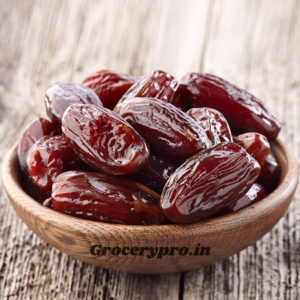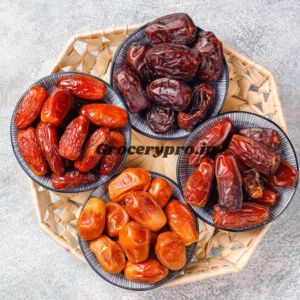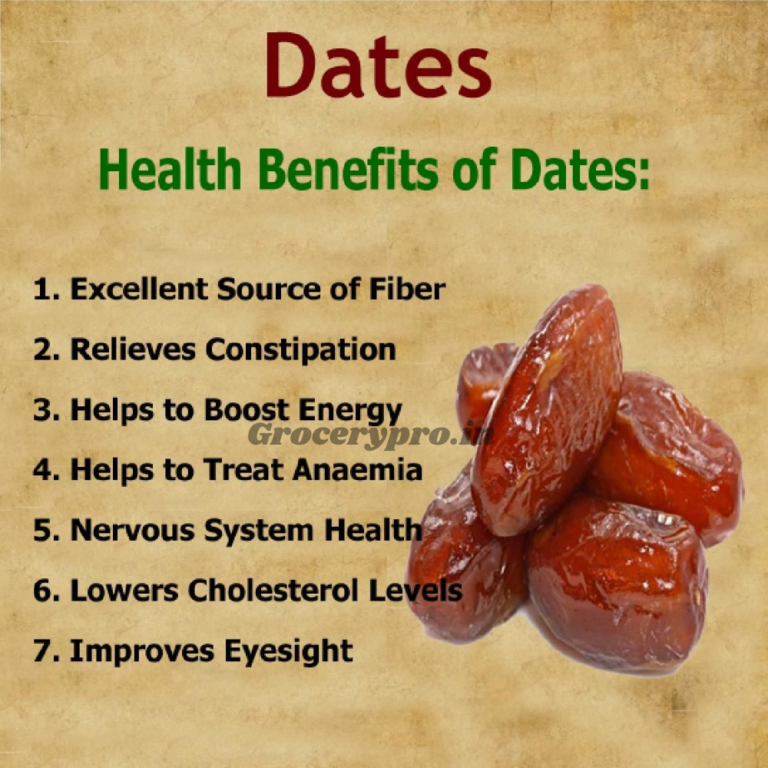Table of Contents
The Date Palm's Gift: Sweetness, Tradition, and Health in Every Bite"

Introduction
Dates, the sweet, chewy fruit of the date palm tree, have been a part of human civilization for thousands of years. Not only are they delicious, but they also hold great cultural and nutritional significance. Indigenous to the Middle East and cultivated since ancient times, dates are revered for their versatility, health benefits, and ability to adapt to various cuisines. These small fruits are much more than just natural sweeteners; they are a nutrient-packed source of energy, essential minerals, and antioxidants. In this comprehensive blog, we will delve into the history, cultivation, nutritional profile, varieties, health benefits, and various culinary uses of dates.
Historical Roots: Dates in Ancient Civilizations
The history of dates stretches back to 6000 BC, making them one of the earliest cultivated fruits. Dates originated in the Middle East and North Africa, where the desert climate provided ideal growing conditions. Ancient civilizations, including the Egyptians and Mesopotamians, prized dates not only as food but also for medicinal purposes. In ancient Egypt, dates were a staple in the diet and were used in rituals, including offerings to gods. The fruit also played a key role in the development of agriculture in arid regions, as date palms provided food, shade, and building materials.
The spread of Islam in the 7th century further boosted the cultivation and consumption of dates. In Islamic tradition, dates hold religious significance, particularly during Ramadan, when they are eaten to break the fast. The Prophet Muhammad is said to have encouraged the consumption of dates, emphasizing their benefits for health and spirituality. This religious and cultural heritage has contributed to the continued popularity of dates in the Arab world and beyond.

- Cultivation of Dates: The Date Palm Tree
The date palm tree, scientifically known as Phoenix dactylifera, thrives in arid regions with high temperatures and little rainfall. It requires well-drained soil, plenty of sunlight, and a reliable water source, often through irrigation. Date palms are dioecious, meaning they have separate male and female trees. Pollination is typically done manually by transferring pollen from male trees to female trees, a practice that has been used for centuries. The lifecycle of a date palm tree is slow but steady. It takes several years for the tree to bear fruit, and once it does, it can continue to produce dates for decades. The fruiting season varies by region but typically occurs between late summer and early autumn. A single tree can yield hundreds of pounds of dates annually, making them a valuable crop in desert economies. There are over 200 varieties of dates, each with its own unique flavor, texture, and size. The quality of the fruit depends on factors such as climate, soil conditions, and irrigation. Major date-producing countries include Egypt, Iran, Saudi Arabia, and the United Arab Emirates, with dates being exported to markets around the world.
Types of Dates: A World of Variety
Dates come in a variety of shapes, sizes, colors, and flavors. Some are soft and sticky, while others are dry and chewy. Among the most popular varieties are:
-
Medjool Dates: Known as the “king of dates,” Medjool dates are large, soft, and exceptionally sweet. They have a caramel-like flavor and are often eaten as a snack or used in desserts.
-
Deglet Noor: A semi-dry variety, Deglet Noor dates are smaller than Medjool dates and have a firm texture. They are commonly used in cooking and baking due to their subtle sweetness.
-
Barhi Dates: These dates are soft, round, and golden when fresh. They have a delicate, buttery flavor and are often eaten in their fresh, unripe stage, which gives them a crisp texture.
-
Ajwa Dates: A prized variety in Islamic tradition, Ajwa dates are small, dark, and rich in flavor. They are often associated with religious rituals and are believed to have medicinal properties.
-
Zahidi Dates: A semi-dry variety with a golden color and a nutty flavor, Zahidi dates are commonly used in commercial food production due to their firm texture and long shelf life.
-
Halawy Dates: These dates are soft, sweet, and small to medium in size. Their honey-like flavor makes them a favorite for snacking. Each variety of date offers its own unique combination of taste and texture, catering to different culinary uses. Whether eaten on their own, stuffed with nuts, or incorporated into recipes, dates are a versatile ingredient.

Nutritional Profile of Dates: Packed with Goodness
Dates are often referred to as nature’s candy due to their natural sweetness, but they are much more than just a sugary treat. These small fruits are a nutritional powerhouse, packed with essential vitamins, minerals, and fiber. Here is a breakdown of the key nutrients found in dates:
-
Carbohydrates: Dates are rich in natural sugars, primarily glucose and fructose, making them an excellent source of quick energy. They are particularly popular among athletes and individuals looking for a natural energy boost.
-
Fiber: One of the standout features of dates is their high fiber content. A 100-gram serving of dates provides around 7 grams of fiber, which supports healthy digestion and helps regulate blood sugar levels.
-
Vitamins: Dates are a good source of several essential vitamins, including vitamin B6, which plays a key role in brain development and function. They also contain small amounts of vitamin A, K, and folate.
-
Minerals: Dates are packed with important minerals such as potassium, magnesium, copper, and manganese. Potassium is vital for maintaining healthy blood pressure levels, while magnesium supports muscle and nerve function.
-
Antioxidants: Dates are rich in antioxidants, particularly flavonoids, carotenoids, and phenolic acid. These compounds help protect the body from oxidative stress and inflammation, reducing the risk of chronic diseases.
The nutritional benefits of dates extend beyond their individual components. When consumed as part of a balanced diet, they contribute to overall health and well-being.
Health Benefits of Dates: A Natural Remedy
The health benefits of dates are well-documented, with research showing their positive effects on various aspects of human health. Below are some of the most notable health benefits associated with regular consumption of dates:
-
Digestive Health: Due to their high fiber content, dates are excellent for promoting healthy digestion. They can help prevent constipation by adding bulk to the stool and promoting regular bowel movements. The soluble fiber in dates also acts as a prebiotic, feeding beneficial gut bacteria.
-
Heart Health: Dates are rich in potassium, a mineral that helps regulate blood pressure and reduce the risk of heart disease. Their antioxidant content also supports cardiovascular health by reducing inflammation and preventing oxidative damage to blood vessels.
-
Bone Health: Dates contain several minerals that are essential for maintaining strong and healthy bones, including calcium, phosphorus, and magnesium. These minerals work together to prevent bone disorders such as osteoporosis.
-
Energy Boost: The natural sugars in dates, combined with their fiber content, make them an ideal snack for providing sustained energy. Unlike processed sugary snacks, dates provide a steady release of energy without causing a rapid spike in blood sugar levels.
Antioxidant Properties: The antioxidants found in dates, such as flavonoids and carotenoids, help protect cells from damage caused by free radicals. This protection is important for reducing the risk of chronic diseases like cancer and heart disease.
Pregnancy and Labor: Several studies have suggested that dates may have benefits for pregnant women. Consuming dates during the final weeks of pregnancy may help promote cervical dilation and reduce the need for induced labor. Dates are also a natural source of energy for pregnant women, helping them meet the increased nutritional demands of pregnancy.
Brain Health: The presence of vitamin B6 in dates plays a crucial role in brain function. Research suggests that dates may help improve memory and cognitive performance by reducing inflammation in the brain.
Blood Sugar Control: Despite their sweetness, dates have a relatively low glycemic index (GI), meaning they do not cause rapid spikes in blood sugar levels when consumed in moderation. This makes them a suitable snack for individuals with diabetes, though portion control is important.
Culinary Uses of Dates: A Versatile Ingredient
Dates are not only a nutritious snack but also a versatile ingredient in the kitchen. Their natural sweetness and chewy texture make them ideal for a wide range of dishes, from savory to sweet. Here are some of the most popular culinary uses of dates:
-
Snacking: Dates are often eaten on their own as a quick and nutritious snack. They can also be stuffed with nuts, such as almonds or walnuts, for an extra dose of protein and healthy fats.
-
Smoothies and Shakes: Adding dates to smoothies or shakes is a great way to naturally sweeten these beverages. They blend well with ingredients like bananas, spinach, and almond milk, providing both flavor and nutritional benefits.
-
Baking: Dates are commonly used as a natural sweetener in baking. They can be pureed and added to cakes, cookies, and muffins, or chopped and sprinkled into granola bars and bread.
-
Salads: Chopped dates add a sweet contrast to savory salads. They pair well with ingredients like arugula, goat cheese, and toasted nuts, creating a balance of flavors and textures.
-
Energy Balls: Dates are a popular base for homemade energy balls, which are made by blending dates with nuts, seeds, and other ingredients. These energy balls are perfect for a quick, healthy snack on the go.
-
Desserts: Dates are used in a variety of desserts, such as date pudding, date bars, and stuffed dates. They also make a great topping for yogurt, ice cream, and oatmeal.
Savory Dishes: In Middle Eastern and Mediterranean cuisine, dates are often used in savory dishes, such as tagines and stews. They add a subtle sweetness that complements spices like cumin, cinnamon, and turmeric.
Natural Sweetener: Date syrup, also known as date honey, is a popular natural sweetener. It is made by blending dates with water and straining the mixture to create a thick, syrupy consistency. Date syrup can be drizzled over pancakes, waffles, or porridge, and used as a substitute for sugar in recipes.

Conclusion
Dates are a remarkable fruit that has stood the test of time, both as a cultural symbol and a nutritional powerhouse. Their rich history, diverse varieties, and impressive health benefits make them an essential part of many diets around the world. Whether you enjoy them as a snack, use them in cooking and baking, or incorporate them into your wellness routine, dates offer a wealth of benefits that go beyond their sweet taste. From ancient civilizations to modern kitchens, dates continue to play a vital role in our lives, providing sustenance, energy, and a connection to nature. So, the next time you reach for a handful of dates, remember that you’re not just enjoying a delicious snack—you’re indulging in a piece of history and a wealth of health benefits.